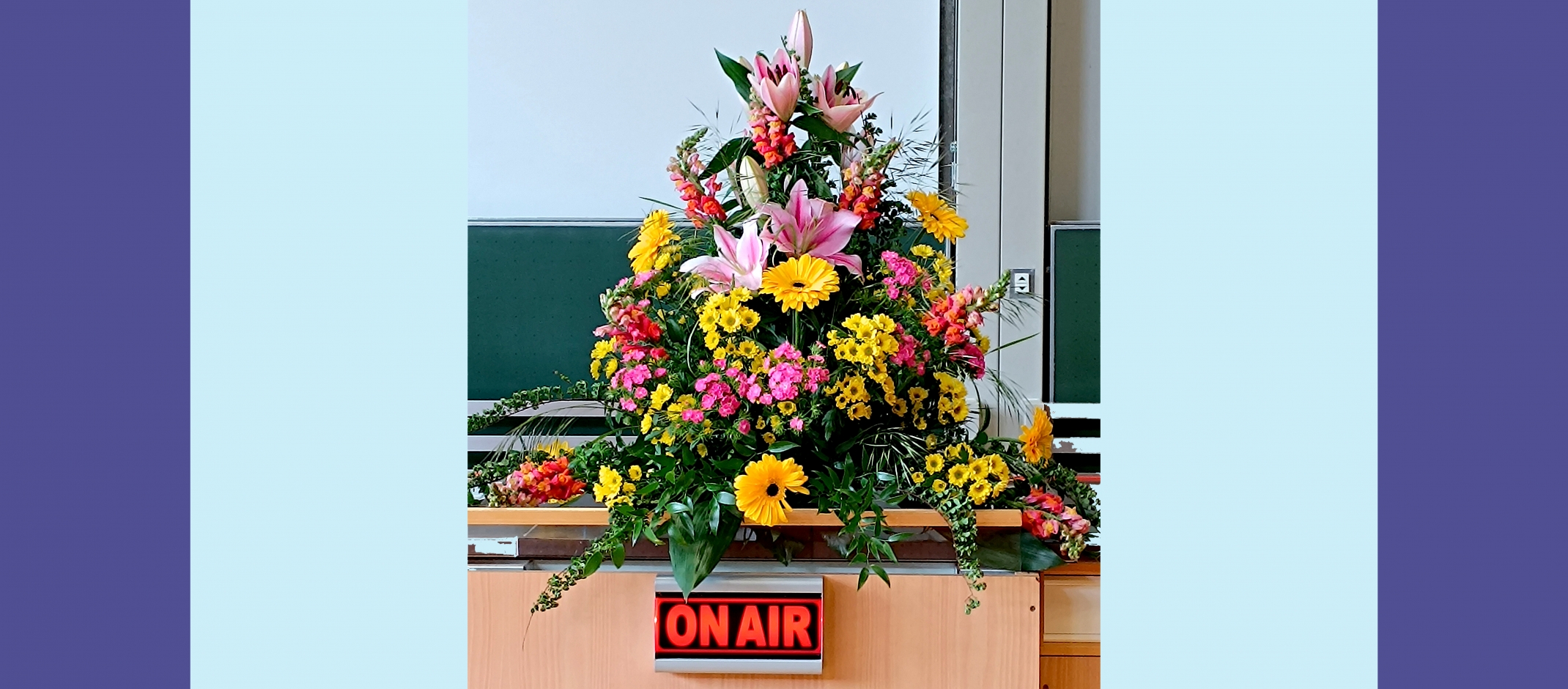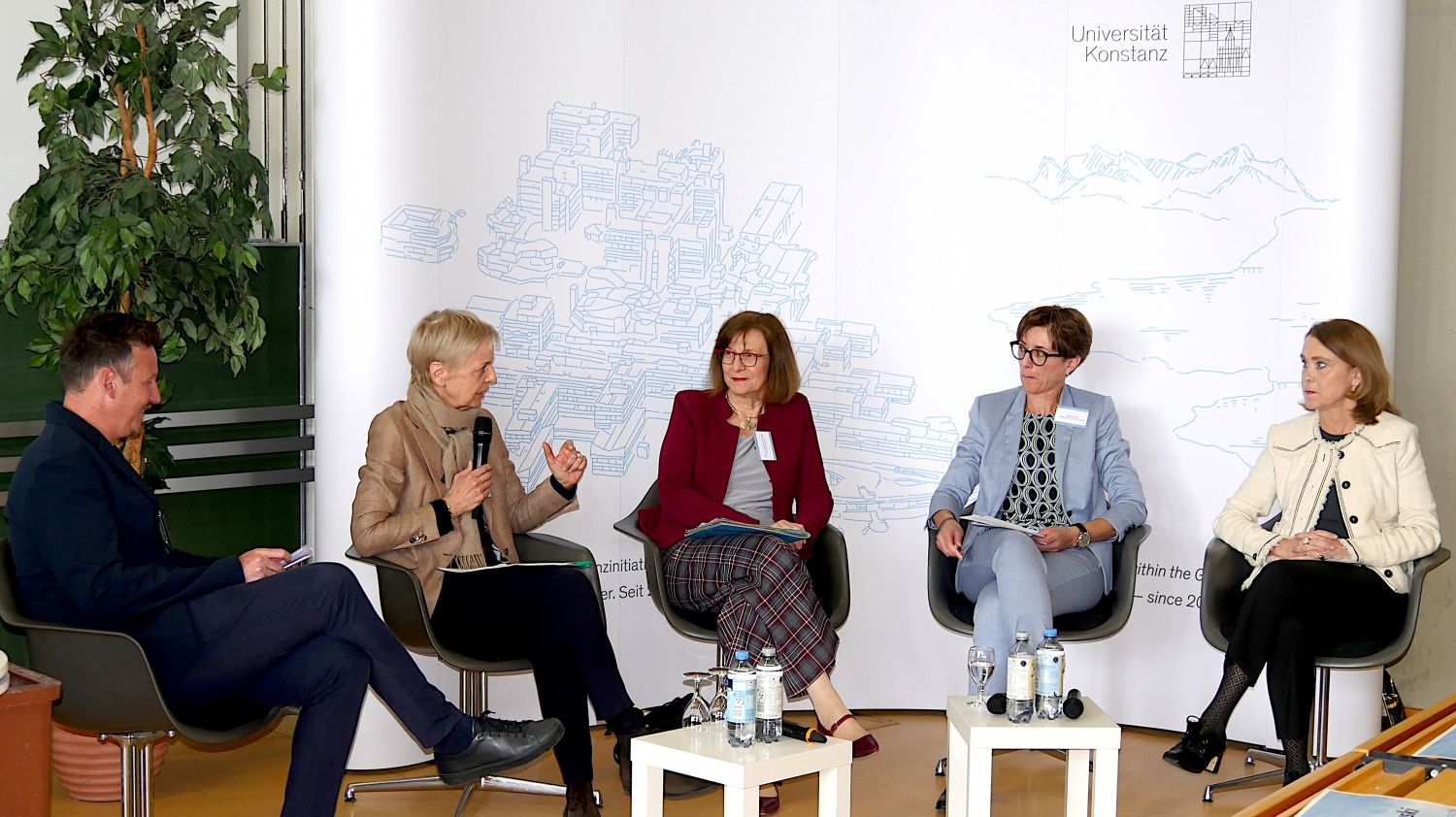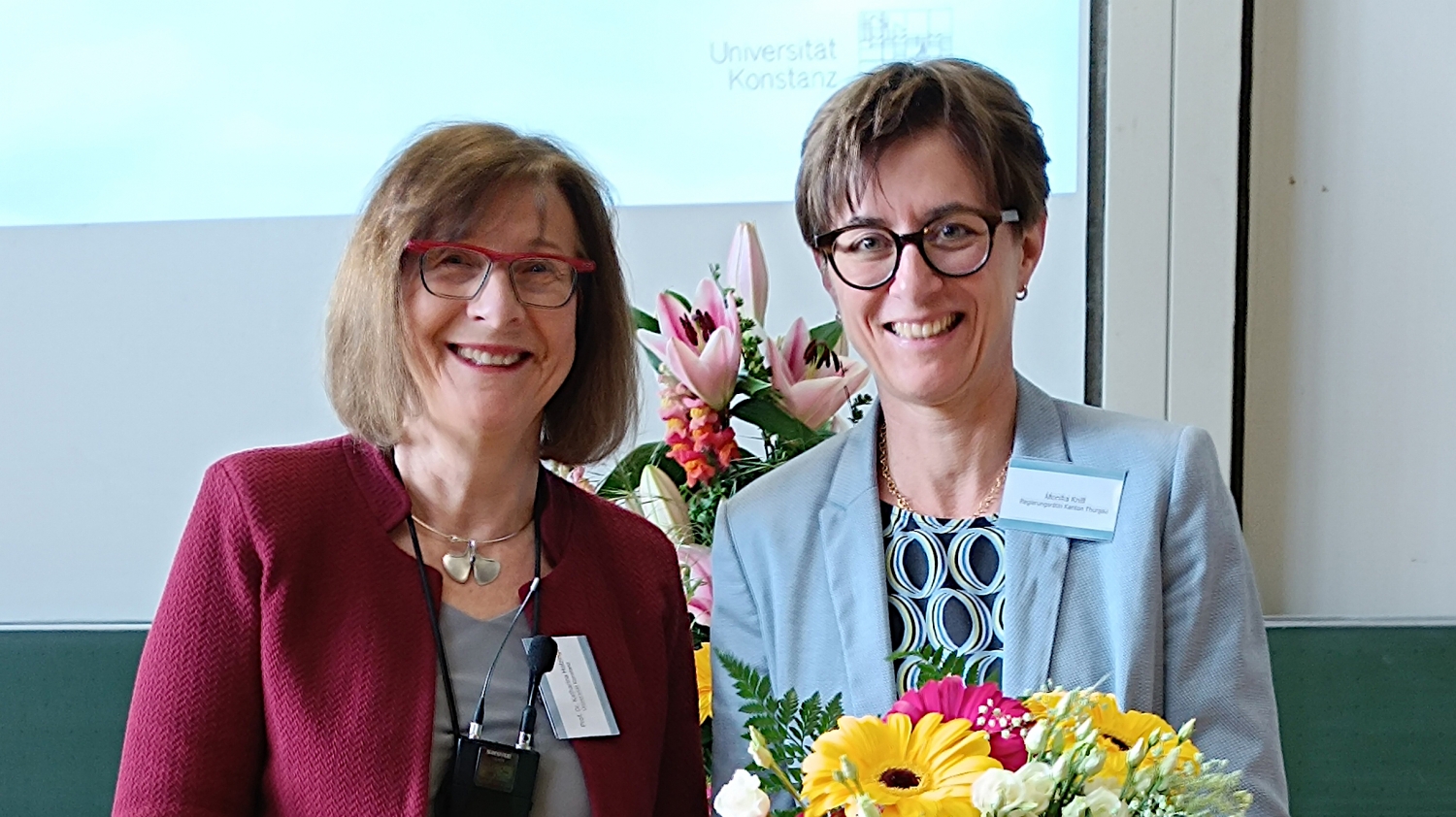"Z'sämme!"

The Swiss word Z’sämme! (together) in the conference title sums up the strong cross-boarder commitment to academic collaboration. The Ministry of Science, Research and the Arts Baden-Württemberg (MWK) along with the University of Konstanz hosted a conference to discuss new impulses for cross-border connections among universities in Switzerland and Baden-Württemberg. What already works well? Where are the rough patches? What can we learn from each other? For the university context, the fact that negotiations between Switzerland and the European Union on an institutional agreement were discontinued in 2021 is also a clear overarching topic. Here, Switzerland's relationship to the "Horizon Europe" framework programme is particularly important. In 2024, negotiations resumed after successful exploratory discussions.
The podium discussion included Petra Olschowski (Minister of Science), Monika Knill (member of the governing council in the Canton of Thurgau), Rector Katharina Holzinger (University of Konstanz) and Rector Sabina Larcher (Thurgau University of Teacher Education (PHTG)). Markus Rhomberg, managing director of the transnational university network "Wissenschaftsverbund Vierländerregion Bodensee", moderated the discussion.
© University of KonstanzFrom left to right: Markus Rhomberg, Sabina Larcher, Katharina Holzinger, Monika Knill and Petra Olschowski.
The exclamation mark at the end of the event's title underscores just how well this cross-border collaboration works. Academic collaboration between Switzerland and Baden-Württemberg is already in full bloom. For example, at the University of Konstanz, there are transnational associated institutes, joint bridge professorships with the PHTG in Switzerland, cross-border teacher training at the Binational School of Education, and close ties to other universities within the transnational university network "Wissenschaftsverbund Vierländerregion Bodensee". It has long been commonplace for researchers from Baden-Württemberg and Switzerland to submit project proposals together.
Making collaboration possible
Things are certainly humming along, but this success stems from much hard work. Every project partnership requires harmonizing two countries' statutes, procedures and regulations. "Setting up each individual bridge professorship is a lot of work, but these positions also open up many opportunities", explains Petra Olschowski. "The collaboration has become incredibly strong over time", adds Sabina Larcher, rector of the PHTG. What was once a rocky road, has now become much smoother. People on both sides of the border have gotten to know each other, they know whom to contact. "We are closely connected to each other. Today, there are no longer major hurdles to cross-border collaboration", confirms Katharina Holzinger, rector of the University of Konstanz. At the conference, one thing became clear: it is now much easier to work together.
"Switzerland is more than a neighbouring country for us – we are truly partners", says Petra Olschowski. The proof is in the pudding, with about 130 cross-border collaborations now linking universities in Baden-Württemberg and Switzerland. "Both regions are leaders in innovation and see research as a strategic investment in the future", the minister explains. There is a keen interest in collaboration on both sides, and everyone works hard to cut through regulatory red tape and make this possible. The shared philosophy is "Let's see what is doable", says Alexander Hasgall, Head of International Funding Policy at the Swiss National Science Foundation (SNF).
"Researchers want to collaborate with each other. Our job is to make this possible, and to make it easy."
Alexander Hasgall, Head of International Funding Policy at the Swiss National Science Foundation (SNF)
A key to this is "not to politicize the university landscape, but rather to provide good framework conditions for these collaborations to develop", emphasizes Monika Knill, a member of the governing council in the Canton of Thurgau.
Learning from each other
As you would expect, there are also differences between the regions. "The question that makes border regions so exciting is: What is the same on both sides? And where do people have different values?", explains Michael Grossniklaus, director of the Thurgauer Institut für Digitale Transformation (TIDiT) and a computer science professor at the University of Konstanz. In the area of contract research, when researchers and industry collaborate, he sees the countries take different perspectives. In Germany, he observes a critical view of contract research, whereas in Switzerland it is seen as highly desirable. This variety of viewpoints does not necessarily mean disagreement, but rather provides a starting point for learning from each other.
Rector Katharina Holzinger agrees: "In the area of collaboration with industry, the Swiss perspective shows us at the University of Konstanz that we need to take greater strides in this direction". The Lake Constance region, in particular, with its highly industrialized economy and strong service sector, has further potential for both technology transfer and social innovations.
© University of KonstanzAfter 16 years as a member of the governing council in the Canton of Thurgau, Monika Knill leaves this office in May 2024. Rector Katharina Holzinger thanks her for "many years of very fruitful collaboration and a high level of commitment".
At the conference, everyone welcomes the resumption of negotiations between the European Union and Switzerland regarding the EU framework programme "Horizon Europe". The partnership between Baden-Württemberg and Switzerland is slated to grow further: In February 2024, the state of Baden-Württemberg and the Canton of Zurich signed a Memorandum of Understanding calling research institutions in both regions to expand their existing cross-border collaborations and establish new partnerships.
Zeno Danner, the Konstanz district commissioner, concludes that academic collaboration between Switzerland and Baden-Württemberg exemplifies successful cross-border cooperation. One key factor for this success is the ever-present "trust in the expertise of the corresponding organization on the other side of the border". He calls for this same trust to apply in the arena of political collaboration – and says policy, too, can benefit from close partnerships.
Speakers at the conference "Z‘sämme | Zusammen!":
- Petra Olschowski, Minister of Science, Research and the Arts Baden-Württemberg
- Monika Knill, member of the governing council in the Canton of Thurgau
- Professor Katharina Holzinger, rector of the University of Konstanz
- Professor Sabina Larcher, rector of the Thurgau University of Teacher Education (PHTG)
- Dr Jörn Achterberg, Programme Director International Affairs, German Research Foundation (DFG)
- Dr Alexander Hasgall, Head of International Funding Policy, Swiss National Science Foundation (SNF)
- Professor Michael Grossniklaus, University of Konstanz and director of the Thurgauer Institut für Digitale Transformation (TIDiT)
- Professor Daniel Müller, ETH Zurich
- Moderator: Markus Rhomberg, managing director of the transnational university network "Wissenschaftsverbund Vierländerregion Bodensee"
Stream of the panel discussion "Möglichkeiten und Perspektiven der Zusammenarbeit in Forschung und Wissenschaft"


